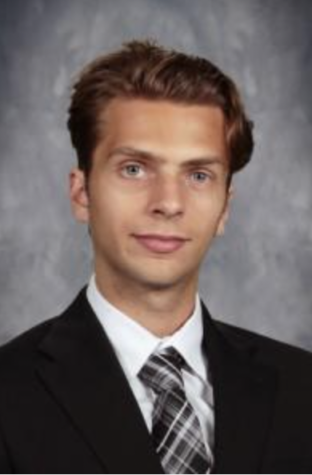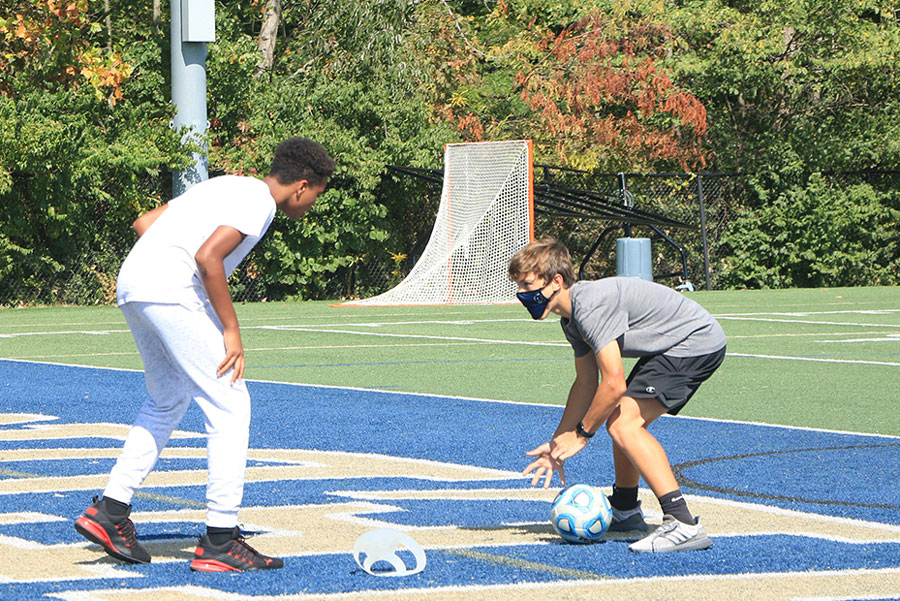Juniors prepare now to be senior mentors
Klee and Fogel instruct members of the Class of 2022
During a warm afternoon last fall, senior peer mentors took their freshman resource students to the football practice field to participate in a get-to-know-you activity.
A select of group of juniors is getting ready now to serve as peer mentors next fall for the Class of 2025.
With the end of the first semester, religion teacher Ms. Katie Klee, who co-directs the freshmen experience, made the yearly transition from overseeing senior peer mentors in freshman resource classes to teaching juniors how to be effective peer mentors next year.
Klee and Mr. Howard Fogel teach the peer mentoring class to a group of about 60 juniors who submitted applications in the fall. Juniors Nick Bozzelli-Levine and Carson Hruskoci are both currently enrolled in the peer mentoring class.
Bozzelli-Levine said, “I was really honored to be a part of this whole thing, and I’m still really excited to be a part of it to learn how to help these freshmen and guide them through their journey.”
Bozzelli-Levine said, “The application process consisted of a resume you had to submit. It also had three short answer questions. They were focusing on service and academics at Cathedral. And then there were two essay questions that were about 250 words each and they were also relating to service at Cathedral, and they asked about extracurricular activities.”
Klee said that the forms were due in November, and she and Fogel made their selections by the beginning of December.
To any sophomores interested in being a peer mentor in the next peer mentor class, Klee said, “(Fogel) and I teach a lot of sophomores who become junior applicants, and he coaches a lot of them, too, but there are some that we don’t get to meet on a teaching or coaching level. I would encourage anybody who’s going to apply, but especially those students, to find ways to talk with us at school (and to) help us to get to know them a little bit better.”
In the first few weeks of the semester, Bozzelli-Levine said, “(The class has been) learning about mental health awareness and we’ve been learning a lot about identifying mental disorders, identifying people who are struggling, and finding ways to help them. (They’re teaching us) to be good listeners and be people who can understand others, understand their feelings and understand that everyone’s going through something.”
Similarly, Klee said, “The social/emotional development and training is really important because we’ve seen those that are trained go from maybe not being aware how to read the signs someone’s giving them about how they’re doing. We’ve been so blessed by the fact that many of the peer mentors then go on to really pay attention to what those signs are and reach out to myself or Mr. Fogel whenever they do see a freshman struggling and then help get them the help that they need.”
Even split into different classes, Klee and Fogel have had to find ways to deal with large class sizes when the pandemic creates additional challenges. Hruskoci said, “Our class is in the theater because we have such a big class. Some days we don’t have a microphone so we join Zooms. We’re on a Zoom but we’re in the same room just so we can hear each other.”
Klee stressed the range of students in this year’s peer mentoring program so that it could reach as many individuals as possible. Klee said, “Variety is more present than ever — personality-wise, background wise, extracurricular involvement — and I think that is a real gift that will be brought to the Freshmen Class. Hopefully, each freshman will have somebody they know they can turn to who as a peer mentor can relate to or share in their experience in some way.”
Hruskoci said, “The main thing (the class) has in common is that we’re all good leaders. We’re pretty vocal. Obviously, you need pretty good communication skills and pretty good leadership to be a peer mentor, so I’d say we all have that in common. Other than that, there’s not many similarities. There’s a lot of different people, which is good, since it brings a lot of diversity in and a lot of different types of people.”
Both Bozzelli-Levine and Hruskoci said that they still would’ve wanted to be a peer mentor if the planned religion electives were available.
Bozzelli-Levine initially wanted to be a peer mentor because of his freshman year experience. He said, “The peer mentors always had amazing insight. They’d tell us ‘you’ve got do this, you’ve got to do this event, you’ve got to sign up for this club or do this sport’ and I always really liked hearing what they had to say because they were the experts, they were the seniors.”
Hruskoci echoed this sentiment. He said, “I want to be a peer mentor because as a freshman, having my peer mentor, I had a lot of fun. They really inspired me and taught me a lot. They really helped me adapt to high school life, and I wanted to set that example for other kids just like my peer mentors.”
Additionally, Carson said, “My brother and sister were both peer mentors, and they said it was a great time, so I wanted to try it.”
Bozzelli-Levine said, “I want to do what the seniors did for me when I was a freshman. I wanted to carry on this tradition and help the freshmen and help the freshmen adjust to life at Cathedral, give them a feeling of the place, help them whether they need help with homework or just they need someone to talk something through with.”

Liam Eifert is a Senior and the Megaphone co-editor-in-chief. He runs cross-country and track for Cathedral. In his free time, he likes to read, study...







